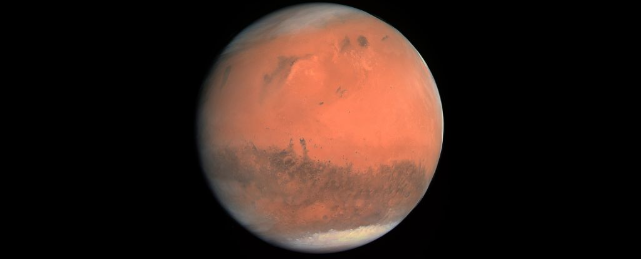


 12:5:26
12:5:26  2025-02-25
2025-02-25  663
663

Its ruddy complexion is the defining characteristic of Mars, the idiosyncrasy that marks it out from all the other planets of the Solar System. But a new study suggests we may have misunderstood the mechanism whereby its rouge was obtained.
New research shows that the oxidation of iron in Martian rocks was the result of the presence of water, rather than the dry oxidation of hematite, as previously thought.
"We were trying to create a replica Martian dust in the laboratory using different types of iron oxide," explains planetary geologist Adomas Valantinas of Brown University in the US. "We found that ferrihydrite mixed with basalt, a volcanic rock, best fits the minerals seen by spacecraft at Mars."
It's pretty well established that Mars, rich as it is in iron, is red with rust processes that occurred long ago. Over the eons, the rocks containing iron broke down, covering the planet with rufous dust so vivid that even to the naked eye, Mars takes on a reddish hue in the night sky.
But there is more than one way to rust a rock, and that is the issue – because each tells a different tale about the water and mineral history of Mars.
There is now no question that, once upon a time, liquid water sloshed on the surface of the red planet. A body of evidence collected by rovers points overwhelmingly to a once-soggy Mars. But observations of the Martian dust collected by spacecraft studying the planet showed no evidence of water.
This led scientists to conclude that the mineral responsible for Mars's hue must be hematite, which forms under dry conditions and can have a reddish color. Under this model, the hematite formed after water had disappeared from the surface of Mars.
However, Valantinas and his colleagues have convincingly shown that another mineral, ferrihydrite, is a plausible pathway for the rusting of Mars. This is an iron oxide mineral that forms quickly in the presence of cool water, and scientists had previously thought that it may play a role in Mars's redness. But evidence for this was lacking.
The researchers carefully studied and analyzed Mars data from multiple orbiting spacecraft. They compared their hypothesis to the composition of a meteorite from Mars, as well as measurements conducted by multiple Mars rovers over the years. The results of these analyses suggested that ferrihydrite was a plausible explanation for oxidized iron on Mars.
Next, they used a powerful grinder to pulverize different oxidized iron minerals to a grain size equivalent to the size of dust grains on Mars, and analyzed the resultant samples using the same techniques that had been used to analyze Martian dust.
The best match between the observations on Mars and the ground-up samples was not hematite, but ferrihydrite with the formula Fe5O8H · nH2O. This suggests that the minerals must have formed while Mars was still wet, and were then broken down and blown all over, retaining their watery signature.
So, we may have to tweak our understanding of Mars's geological history.
"Mars is still the red planet. It's just that our understanding of why Mars is red has been transformed," Valantinas says.
"The major implication is that because ferrihydrite could only have formed when water was still present on the surface, Mars rusted earlier than we previously thought. Moreover, the ferrihydrite remains stable under present-day conditions on Mars."
This all remains to be confirmed, of course. But with samples of Mars sitting in canisters, waiting to be collected, it may not be too long before we know for sure.
"Once we get these precious samples into the lab," says physicist Colin Wilson of the European Space Agency, "we'll be able to measure exactly how much ferrihydrite the dust contains, and what this means for our understanding of the history of water.
Reality Of Islam |
|

This is the

A computer

Auburn Univ

Poisoning i
 9:3:43
9:3:43
 2018-11-05
2018-11-05
10 benefits of Marriage in Islam
 7:5:22
7:5:22
 2019-04-08
2019-04-08
benefits of reciting surat yunus, hud &
 9:45:7
9:45:7
 2018-12-24
2018-12-24
advantages & disadvantages of divorce
 11:35:12
11:35:12
 2018-06-10
2018-06-10
 6:0:51
6:0:51
 2018-10-16
2018-10-16
al-hussain (peace be upon him)
 10:18:1
10:18:1
 2022-09-21
2022-09-21
 4:25:57
4:25:57
 2023-02-11
2023-02-11
 8:21:9
8:21:9
 2018-06-21
2018-06-21
a hero waters thirsty wild animals
 9:4:9
9:4:9
 2022-01-06
2022-01-06
 12:47:1
12:47:1
 2022-12-20
2022-12-20
 8:39:51
8:39:51
 2022-09-23
2022-09-23
 8:25:12
8:25:12
 2022-03-09
2022-03-09
 5:41:46
5:41:46
 2023-03-18
2023-03-18
| LATEST |